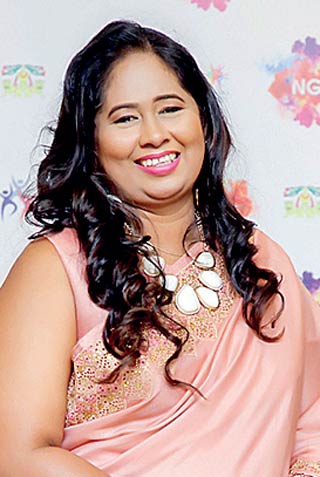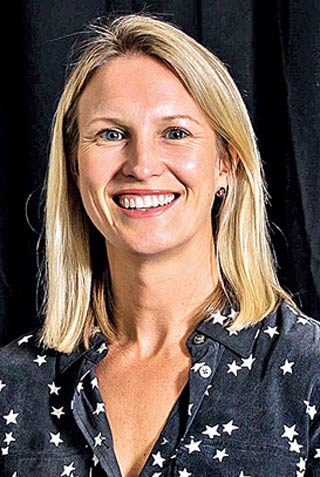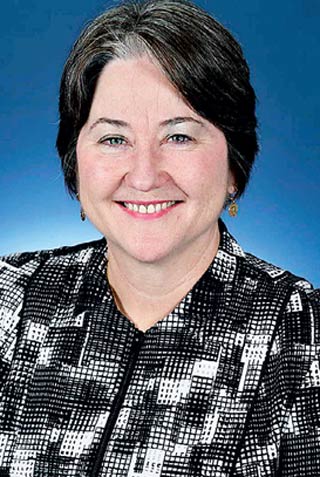Thursday Feb 26, 2026
Thursday Feb 26, 2026
Tuesday, 11 January 2022 00:00 - - {{hitsCtrl.values.hits}}

WIM Founder/Chairperson Dr. Sulochana Segera

IFC Program Manager for Women in Work Sarah Twigg

Acting Australian High Commissioner for Sri Lanka Amanda Jewell
As excitement builds for the 11th 'Top50' Professional and Career Women Awards scheduled to take place on 18 January 2022, Women in Management (WIM), International Finance Corporation (IFC) and the government of Australia, mark years of partnership in co-hosting the awards that celebrate inspirational Sri Lankan women. WIM Founder/Chairperson Dr. Sulochana Segera, IFC Program Manager for Women in Work Sarah Twigg and Acting Australian High Commissioner for Sri Lanka Amanda Jewell discuss how the awards have made lasting impacts on Top50 recipients and organisations, the setbacks shouldered disproportionately by Sri Lankan women during COVID-19, and the path towards equality.
|
|
Q: The Top50 awards are to be held on 18th January 2022 for the 11th year running. What is the backstory of the awards, and why is it important to recognise women’s achievements?
Dr Sulochana Segera: The start of the Top50 Awards goes all the way back to 2011. It was a time when I noticed that a lot of Sri Lankan women – especially youngsters – looked up to role models from elsewhere, when there were many inspiring women within the country. I wanted to change this. I wanted to show the country and the world that Sri Lanka has remarkable and inspiring women from all walks of life. That’s how the awards came into play. We started with 25 women and five awards, but now it has evolved into an annual event and more than 470 Sri Lankan women have been celebrated for various achievements over the past decade.
The success of the awards led to many opportunities – especially for the award winners themselves. This was not just about empowering women, but also about highlighting the actual need for having women on boards – which is beneficial for the economy and society as a whole. I think with the awards, we were able to change this narrative to some degree. We took women to the professional fora – by creating platforms for professional networking, leadership conferences and even thought leadership programs. What’s interesting is that we brought the men forward too – as allies and champions of gender equality. There’s still a long way to go in achieving gender equality in Sri Lanka, but WIM will continue to do its part always.
Q: How have the awards evolved over the past decades? Could you share some success stories?
Dr Sulochana Segera: WIM has come a long way over the years, so has the Top50 awards. We’ve evolved with time, introducing diverse award categories to suit current needs and most importantly, opening up more opportunities for women to shine. On this journey, we have had the support of various partners. Our biggest supporter for the past seven years has been the International Finance Corporation (IFC), and the government of Australia since 2018. The Top50 Awards which started in Sri Lanka now covers Maldives, Canada and will soon cover Australia too.
There are many success stories. I’ve heard of how the Awards have led to career progression for many past winners. Often, Sri Lankan women are hesitant to take their spot in the limelight, but the Top50 Awards have created a platform to showcase their talents and achievements and inspire others. For example, Chamila Bandara -Career Role Model of the Year at last year’s awards, and Director/CEO of Mountain Hawk Express, Licensee of Federal Express Corporation- said how it was a past award winner who encouraged her to apply for the awards when she was shying away. That’s the impact we want – women empowering and inspiring others to move forward.
I am proud that the Top50 Awards distinguishes itself by being solely based on the achievements of each individual. We do not charge for nominations. Every year, we have an esteemed and diverse panel of judges who meticulously evaluate every candidate before selecting the best ones. This is a huge undertaking, but our ultimate motive is to highlight the real impact women have made and also for them to inspire others, making a positive difference.
What’s interesting is that we do not stop at the awards. We continue to endorse the award winners as brand ambassadors of women leadership and empowerment so they can further inspire other Sri Lankan women.
|
|
Q: IFC has been a partner of Top50 awards for several years, supporting WIM in taking the awards to a new level. How has this partnership helped make a difference in Sri Lanka and for Sri Lankan women?
Sarah Twigg: Through IFC’s Women in Work partnership with the government of Australia, we are working to close gender gaps in Sri Lanka’s private sector while improving business performance. WIM has been a steadfast partner throughout this journey and has played a critical role in making our vision of promoting women’s business leadership for inclusive growth a reality. The Top 50 Awards demonstrate the significant role women play in bringing about transformational change as employees, entrepreneurs, and business leaders. We’ve seen how the awards have grown over the years – not just in the number of applications but also in terms of impact. Recognizing women who have achieved success in their chosen careers, surpassing roles ascribed by tradition, creates a legacy that galvanizes and motivates others.
Award winners have gone on to become recognized leaders in their respective fields and have been catalysts for change in their organisations and communities. We have seen that more than half the career Award winners experience career advancements, while over 90% of SME and micro business owners recognized by the Awards have reported increased brand recognition and market growth.
Q: What role is the government of Australia playing in terms of uplifting Sri Lankan women?
Amanda Jewell: Achieving gender equality and empowering women is an important aspect in our development program here in Sri Lanka. Gender is one pillar in our development program targeting women as the main beneficiary. Additionally, all our other programs also target women and girls as a specific group. Women in Work, our first standalone gender equality program in Sri Lanka, in partnership with the IFC, provides a tangible way to demonstrate Australia’s commitment to women’s economic empowerment in Sri Lanka. Separately, our Sexual and Gender Based Violence program in Mannar seeks to reduce the incidents of violence against women and girls in Northern Sri Lanka, in partnership with UN agencies. Our Skills for Inclusive Growth provides vocational training in the East especially women working in the tourism sector. The Market Development Facility programs seek to promote employment opportunities for women in many sectors including tourism. Australia also provides scholarships and learning opportunities for women to build their skills by accessing Australian educational institutions, through our Australia Awards program.
 Global research has shown that greater inclusion in the workplace is not only the right thing to do, but it is good for business. However more organisations, public and private, must work towards parity in top positions to build a more inclusive and sustainable future. The culture of the organisation and the commitment by top management in creating an inclusive work culture is critical in combating unconscious biases and negative organisational norms that hold women back Global research has shown that greater inclusion in the workplace is not only the right thing to do, but it is good for business. However more organisations, public and private, must work towards parity in top positions to build a more inclusive and sustainable future. The culture of the organisation and the commitment by top management in creating an inclusive work culture is critical in combating unconscious biases and negative organisational norms that hold women back- Amanda Jewell - |
Q: What are some common forms of stereotyping that successful women have to contend with on a daily basis? And what can both men and women do to counter this?
Dr Sulochana Segera: Although many gender-related barriers and biases have declined over the years, career advancement opportunities for women continue to be negatively affected by gender stereotypes, which shape managerial behaviour and occupational outlooks in the workplace with patriarchal expectations. The theoretical transition from Women in Management to Women and Management did not change the practice of gender stereotyping in society. A few examples we see are male attitudes towards women’s success, women’s reluctance to work for female bosses, lack of female mentors, successful women being isolated in their leadership and restricted to networking only among successful leaders, and trying to find safe circles to network are some of the barriers.
Both genders should accept their differences. The change should start from the corporate boards where they provide opportunities based on competencies regardless of gender. A woman should be able to share her opinion and expertise without being labelled ‘aggressive’. This is one of the major reasons why many women keep their views to themselves. Also, women should not compete with men on gender but they should compete on delivering results. Men should adjust any perception of women as soft or weak, and should regard their female colleagues as team members or leaders.
Q: Some might scoff at the idea of equality at the workplace, arguing that merit, irrespective of gender, should trump all other considerations. How would you respond to this? How does inclusivity impact the bottom line, in terms of productivity and growth?
Sarah Twigg: The business case for gender equality is compelling – investing in women strengthens the companies they work in and lead. When companies proactively recruit, retain and promote women, they benefit from increased innovation and collaboration, increased productivity, improved employee satisfaction, and are able to position themselves as an employer of choice. They are also better able to serve their clients’ and customers’ needs, by better representing the diversity of consumers.
There is also a compelling case for increasing the role of women in corporate decision-making roles. As IFC’s new research points out, in Sri Lanka, the top 30 Colombo Stock Exchange (CSE)-listed companies with higher gender diversity perform better on financial metrics such as Return on Equity, Return on Total Assets and Price to Earnings Ratio. IFC research also demonstrates a strong correlation with gender diversity on boards and in C-suite management, and non-financial performance metrics such as enhanced environmental, social, and governance standards. New evidence is also demonstrating that gender diversity within organisations can have a significant impact in combating climate change, with a 1 percentage point increase in the share of female managers leading to a 0.5% decrease in CO2 emissions.
Q: Women are increasingly taking up leadership positions in business and elsewhere, compared to even a decade ago. But few would disagree that there is still a long way to go. What are some areas, in your opinion, with significant room for improvement in this regard?
Amanda Jewell: Many forward thinking organisations support women in the workplace as they understand the value of gender parity and inclusion in their organisations, and within leadership positions. Global research has shown that greater inclusion in the workplace is not only the right thing to do, but it is good for business. However more organisations, public and private, must work towards parity in top positions to build a more inclusive and sustainable future. The culture of the organisation and the commitment by top management in creating an inclusive work culture is critical in combating unconscious biases and negative organisational norms that hold women back. It is the responsibility of the management to build and support a pipeline of women who can access any position by providing equal opportunity to gain the skills and experience that is required to achieve leadership positions. Mentoring by senior management for top positions is key in providing confidence to women to reach the top. Additionally, supportive internal policies should be in place providing women the suitable work environment to achieve their potential. Human resource policies should provide equal opportunities when hiring, grooming, and promoting staff. Flexible and remote work options, regulated and safe childcare options, and parental leave for both genders to take up caregiving responsibilities are also important. All forms of gender-based harassment in the workplace should be addressed and stopped.
Q: The pandemic has been a setback for much of the progress made towards equality. In what ways has COVID-19 impacted working women, and how do you propose Sri Lanka overcome this challenge?
Sarah Twigg: COVID-19, undoubtedly, has rolled back some hard-won battles in achieving gender equality – which is not just a blow to women and societal progress, but also to economies and businesses. We see women juggling additional household responsibilities and childcare, while also often taking on additional responsibilities at work in response to the crisis. Our studies on the impact of COVID-19 on employment found women were twice as likely as men to report increased household and care responsibilities as a result of the global pandemic. These factors have resulted in more women losing their jobs due to the pandemic than men. Global estimates suggest women’s job loss rates are about 1.8 times higher than men’s. There has also been a sharp rise in gender-based violence as a result of lockdowns and the increased financial pressures faced by individuals and families. We have seen increased mental health concerns among employees, with almost one-quarter of women and men reporting being distracted due to health, stress or mental well-being issues. This can translate into decreased productivity and commitment at work, as well as a range of other negative outcomes for individuals and their employers.
So, as we all look forward to a resilient recovery, there is an opportunity for the private sector to rebuild with a focus on gender equality. We are seeing greater support for flexible working options across most industries, as well as the rapid uptake of new technologies to help staff and teams to work more efficiently and from locations other than the workplace. Companies are re-evaluating their processes and practices to streamline them wherever possible, and to enable employees to better balance work and personal life. We are also seeing companies take proactive steps to support the childcare needs of their employees – for both mothers and fathers – as well as to support the physical and mental health needs of their workforce. A proactive focus on recruiting, retaining and promoting women among all businesses is critical for ensuring the talent of Sri Lanka’s female workforce can be fully utilized in the country’s pandemic recovery.
Q: Sri Lanka, and indeed the world, is facing an unprecedented crisis at the moment across multiple fronts – be it public health, finance, education, or business. How can we support these women to continue playing a key role in the country’s path to recovery?
Amanda Jewell: Many women globally are leading the health response, exposing them to a greater risk of infection. At the same time, women are also shouldering much of the burden at home, with school and childcare closures and gender inequalities in unpaid work. Women also have a higher risk of job and income loss, and face increased risks of violence, exploitation, abuse or harassment during times of crisis and quarantine. Governments and private organisations must adjust policies to support women and their unique needs during the crisis and towards recovery. They must adapt flexible working methods to help parents manage work and caring responsibilities during lockdowns. There is some evidence that women operate businesses with lower levels of capitalisation and are more reliant on self-financing. Globally governments should consider extending access to unemployment benefits to disadvantaged groups and ensure that small women business owners and self-employed women have adequate financial support to survive the crisis and continue to support the economy. Ensuring that service delivery for victims of gender-based violence is integrated across relevant areas such as health, social services, education, employment, and justice.